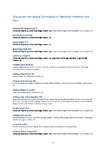Dementia prevention, intervention, and care
| dc.contributor.author | Livingston, G | |
| dc.contributor.author | Sommerlad, A | |
| dc.contributor.author | Orgeta, V | |
| dc.contributor.author | Costafreda, SG | |
| dc.contributor.author | Huntley, J | |
| dc.contributor.author | Ames, D | |
| dc.contributor.author | Ballard, C | |
| dc.contributor.author | Banerjee, Sube | |
| dc.contributor.author | Burns, A | |
| dc.contributor.author | Cohen-Mansfield, J | |
| dc.contributor.author | Cooper, C | |
| dc.contributor.author | Fox, N | |
| dc.contributor.author | Gitlin, LN | |
| dc.contributor.author | Howard, R | |
| dc.contributor.author | Kales, HC | |
| dc.contributor.author | Larson, EB | |
| dc.contributor.author | Ritchie, K | |
| dc.contributor.author | Rockwood, K | |
| dc.contributor.author | Sampson, EL | |
| dc.contributor.author | Samus, Q | |
| dc.contributor.author | Schneider, LS | |
| dc.contributor.author | Selbæk, G | |
| dc.contributor.author | Teri, L | |
| dc.contributor.author | Mukadam, N | |
| dc.date.accessioned | 2021-11-05T12:20:50Z | |
| dc.date.issued | 2017-12 | |
| dc.identifier.issn | 0140-6736 | |
| dc.identifier.issn | 1474-547X | |
| dc.identifier.uri | http://hdl.handle.net/10026.1/18238 | |
| dc.description.abstract |
Acting now on dementia prevention and care can vastly improve living and dying for individuals with dementia and their families and in doing so transform the future for society. Dementia is the greatest global challenge for health and social care in the 21st century. It occurs mainly in older people so increases in numbers and costs are driven, worldwide, by increased longevity resulting from the welcome reduction in people dying prematurely. The Lancet International Commission on Dementia Care met to consolidate the huge strides that have been made and the emerging knowledge as to what we should do to prevent and manage dementia. There were around 47 million people living with dementia globally in 2015, and this is projected to increase to 66 million by 2030 and 115 million by 2050. Dementia affects the individual living with it, who gradually loses abilities, as well as their relatives and other supporters, who have to cope with seeing a family member or friend become ill and decline, while responding to their needs, such as increasing dependency and changes in behaviour. In addition, it affects wider society as people also require health and social care. The 2015 global cost of dementia was estimated to be US$818 billion and this will continue to increase as the numbers of people with dementia rise. Nearly 85% of costs are related to family and social, rather than medical, care. It may be that future new medical care, including public health measures, may replace and possibly reduce some of this cost. Dementia is by no means an inevitable consequence of reaching retirement age, or even of entering the ninth decade. There are lifestyle factors that may reduce, or increase, an individual’s risk of developing dementia. In some populations dementia is already being delayed for years; while in others the numbers of people living with it has increased. In this commission, we have extended current models of risk by including hearing loss, derived from a new review and meta-analysis performed for this report, and social isolation. Incorporating potentially reversible risk factors from different phases of the life-span and not just old age, we are able to propose a novel life-course model of risk from which population attributable fractions have been derived to demonstrate the possible impact on future incidence of successful elimination of the most potent factors. We have brought together all this evidence and have calculated that around one third of dementia may theoretically be preventable. More childhood education, exercise, maintaining social engagement, reducing or stopping smoking, management of hearing loss, depression, diabetes, hypertension and obesity could all contribute to prevention or delay of dementia. There is also preliminary evidence about other potentially modifiable risk factors. We have outlined the mechanisms by which these risk factors impact on the brain. | |
| dc.format.extent | 2673-2734 | |
| dc.format.medium | Print-Electronic | |
| dc.language | en | |
| dc.language.iso | en | |
| dc.publisher | Elsevier BV | |
| dc.subject | Aged | |
| dc.subject | Alzheimer Disease | |
| dc.subject | Dementia | |
| dc.subject | Humans | |
| dc.subject | Risk Factors | |
| dc.title | Dementia prevention, intervention, and care | |
| dc.type | journal-article | |
| dc.type | Journal Article | |
| dc.type | Review | |
| plymouth.author-url | https://www.webofscience.com/api/gateway?GWVersion=2&SrcApp=PARTNER_APP&SrcAuth=LinksAMR&KeyUT=WOS:000418101000028&DestLinkType=FullRecord&DestApp=ALL_WOS&UsrCustomerID=11bb513d99f797142bcfeffcc58ea008 | |
| plymouth.issue | 10113 | |
| plymouth.volume | 390 | |
| plymouth.publication-status | Published | |
| plymouth.journal | The Lancet | |
| dc.identifier.doi | 10.1016/s0140-6736(17)31363-6 | |
| plymouth.organisational-group | /Plymouth | |
| plymouth.organisational-group | /Plymouth/Faculty of Health | |
| plymouth.organisational-group | /Plymouth/Faculty of Health/Peninsula Medical School | |
| plymouth.organisational-group | /Plymouth/Faculty of Health/Peninsula Medical School/PMS - Manual | |
| plymouth.organisational-group | /Plymouth/REF 2021 Researchers by UoA | |
| plymouth.organisational-group | /Plymouth/REF 2021 Researchers by UoA/UoA03 Allied Health Professions, Dentistry, Nursing and Pharmacy | |
| plymouth.organisational-group | /Plymouth/Users by role | |
| plymouth.organisational-group | /Plymouth/Users by role/Academics | |
| plymouth.organisational-group | /Plymouth/Users by role/Researchers in ResearchFish submission | |
| dc.publisher.place | England | |
| dcterms.dateAccepted | 2017-07-19 | |
| dc.rights.embargodate | 2021-11-6 | |
| dc.identifier.eissn | 1474-547X | |
| dc.rights.embargoperiod | Not known | |
| rioxxterms.versionofrecord | 10.1016/s0140-6736(17)31363-6 | |
| rioxxterms.licenseref.uri | http://www.rioxx.net/licenses/all-rights-reserved | |
| rioxxterms.licenseref.startdate | 2017-12 | |
| rioxxterms.type | Journal Article/Review |


